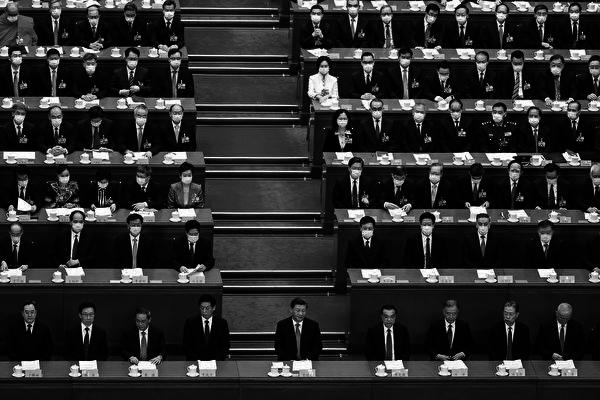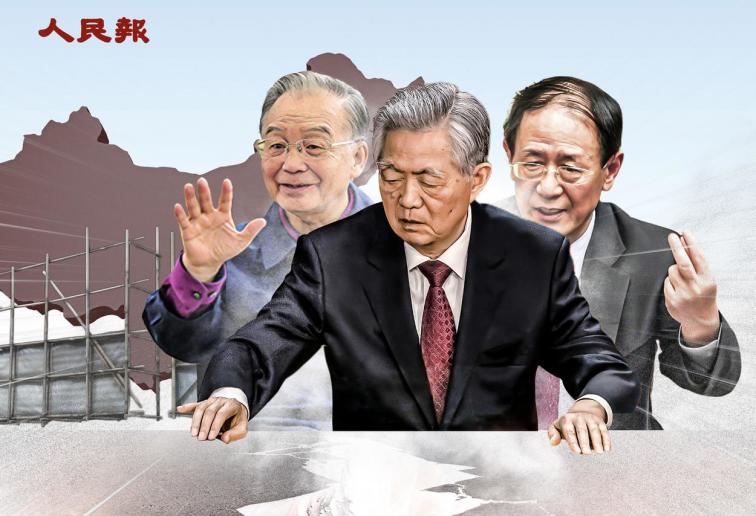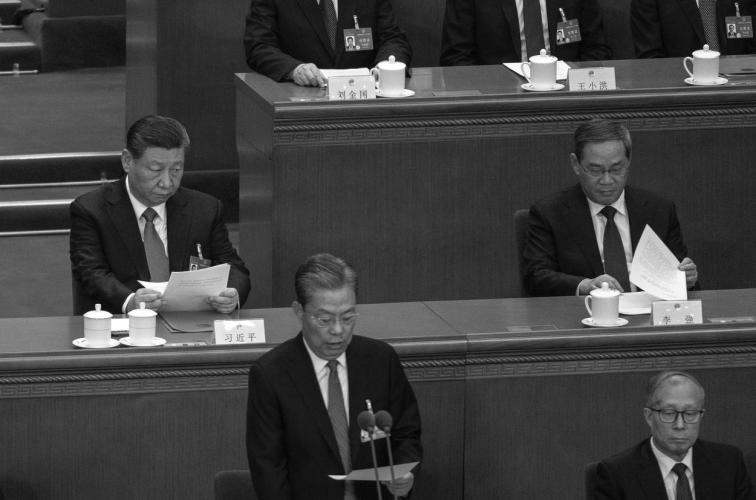Cai Qi and Wang Xiaohong serve as Xi Jinping's gatekeepers. (Composite image)
[People News] Recently, rumours have been swirling about Xi Jinping being stripped of power and potentially stepping down at the Fourth Plenary Session or the 21st National Congress. On June 30, the Chinese Communist Party (CCP) Politburo reviewed a regulation concerning the party's decision-making and coordination mechanism, signalling that the top echelon in Zhongnanhai is now practising collective leadership. This includes top-level design, coordination, promotion, and implementation of major work. Observers interpret this as a basis for party elders to participate in decision-making, essentially establishing a “new party” before July 1, rejecting the concepts of “Xi as the core,” “Xi as the sole authority,” and “Xi Jinping Thought,” and instead setting up a new central leadership. If true, this corroborates the recent external rumours.
These rumours have even spread widely in U.S. political circles.
Former U.S. diplomat Slaidon (Slayton) speculates from multiple angles that Xi Jinping may very well step down as early as the August Fourth Plenary Session. His reasons include: the collective purge or mysterious deaths of several top military officers close to Xi, such as Miao Hua, He Weidong, and Li Hanjun; the sudden removal of Xi’s father Xi Zhongxun's name from a memorial hall in Shaanxi; the halving of Xi’s personal security detail; Xi receiving foreign guests in unofficial settings; and diminished coverage of him in state media. Moreover, Xi was not scheduled to attend the BRICS Summit in Brazil and failed to issue directives on recent domestic flooding, signals that suggest intensified internal struggles within Zhongnanhai and Xi’s possible downfall.
Of course, Xi still holds some power—at least within the Party, government, military, security forces, and propaganda apparatus. He still has loyal followers and others who are unsure of the current political winds. So, will Xi be ousted so easily? It must be noted that to “save the Party,” Xi has made many enemies: he punished political opponents to establish authority, offended vested interest groups through anti-corruption campaigns, angered the public through authoritarianism, and antagonized Western powers through aggressive policies. Should he lose power, he would surely face fierce retaliation from his rivals, with unimaginable consequences.
Xi is aware of this. Naturally, he will fight back to retain power. On July 1, the CCP’s so-called founding day, Xi made a major move that outside observers see as an escalation of internal conflict—a sign of a desperate counterattack.
On June 30 and July 1, Xinhua News Agency, People’s Daily, and the Ministry of National Defence all published a report titled “Xi Jinping: Persist in Promoting Comprehensive and Strict Party Governance by Starting with Work Style; Fully Implement the Requirements of the Party’s Self-Revolution in the New Era”. It stated that Xi Jinping presided over a Politburo group study session on strengthening long-term mechanisms for enforcing the Eight-Point Regulation and correcting “Four Forms of Decadent Work Styles.” Xi emphasized that pushing forward the Party’s self-revolution must include improving awareness, strengthening party spirit, regulating the exercise of power, strictly supervising discipline, and enforcing party governance responsibilities from the top down. He called for issue-oriented focus, intensive education campaigns, and a series of special rectifications—one step at a time, without compromise.
Clearly, this so-called collective study session was a warning to Politburo members: the Party will continue its rectification efforts, ramp up anti-corruption, and launch new political campaigns. Whoever disobeys will not escape punishment. Observers interpret this as a sign of Xi’s fear of losing power, and a declaration of the internal struggle initiated by the “new central leadership” to force him out.
Analysts point out that July 1 is usually a day when the CCP hypes up its achievements, celebrates victories, and promotes unity. Instead, it was filled with talk of rectification, anti-corruption, and struggle—a chilling and abnormal shift. The only explanation is that the CCP’s top leadership is currently locked in a deadly stalemate between pro-Xi and anti-Xi factions.
Another bizarre and hard-to-understand event occurred on June 30: the CCP Politburo held a meeting to review the Work Regulations on the Central Party's Decision-Making and Coordination Mechanism. According to state media, Xi Jinping also presided over this meeting. Two contradictory events happened on the same day—isn’t that strange?
But upon closer reading, one finds that the new regulation report is just over 300 characters long, filled with phrases like “the meeting pointed out” and “the meeting emphasized,” without a single mention of “Xi as the core,” “Xi as the sole authority,” or even “Xi’s directives.” Meanwhile, the “collective study” news is over 1,600 characters long and repeatedly mentions “General Secretary Xi Jinping representing the Party Central Committee,” with phrases like “Xi emphasised” and “Xi pointed out” interspersed throughout. So, is Xi still “the supreme authority”? If the new regulation is about collective decision-making, how can there still be “directives” and “emphases”? How can such contradictions coexist at the same time?
Why? Analysts believe that with the propaganda apparatus still under the influence of Wang Huning, Cai Qi, and fence-sitters, once Xi waves the Central Commission for Discipline Inspection (CCDI) flag and gears up for a fight, the propaganda system will still follow his lead. In the study session news, Xi bluntly stated: the Party is facing an exceptionally complex governing environment, and the “self-revolution” string must be pulled tighter. All party organisations and members, regardless of their level or duties, must take responsibility for self-revolution. Leading cadres—especially senior officials—must set an example. Violations must be strictly dealt with. Corruption and misconduct must be tackled simultaneously. Iron discipline must grow iron teeth to send a zero-tolerance signal to the entire Party, creating a deterrent effect.
This is Xi’s true message: note the keywords—complex governance environment, simultaneous investigation and punishment, iron rules and iron teeth, zero-tolerance, deterrent effect… Can readers see the underlying message here?
(First published by People News)










News magazine bootstrap themes!
I like this themes, fast loading and look profesional
Thank you Carlos!
You're welcome!
Please support me with give positive rating!
Yes Sure!